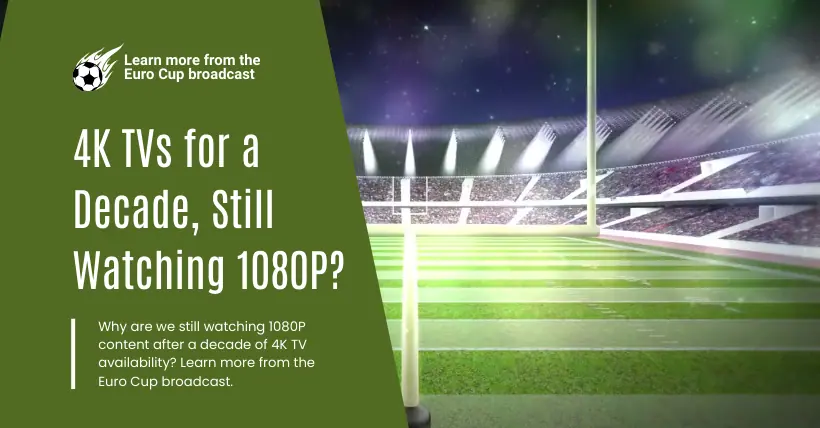A long time ago, the broadcasters of the European Championship announced that this year’s matches would not be broadcast in 4K HDR, but in 1080P HDR. Of course, we feel disappointed because a few years ago, manufacturers of 8K TVs, including brands like Hisense and Samsung, promoted 8K as the best way to watch sports. However, ten years after 4K TVs became widespread, we still have to watch such a highly anticipated football match in 1080P this year. This is undoubtedly a huge irony! As for 8K TVs? Forget about them!
It’s quite an awkward situation because, to be honest, modern information and communication rely heavily on smartphones, which sell in huge numbers every year, rather than on TVs. Major streaming platforms allocate their best resources for broadcasting sports events to their mobile apps rather than delivering the best picture quality on TV. What really infuriates us is that we bought new TVs to watch better quality images, but the result is disappointing!
This issue is not only with football broadcasts but also with global streaming platforms. Only Amazon offers 4K HDR in its basic service, while other streaming platforms, whether it’s Netflix, Disney abroad, or iQiyi, Tencent Video, and Youku in China, require additional fees to watch 4K HDR content. This undoubtedly adds a significant barrier for consumers wanting to adopt 4K HDR!
Regarding the European Championship, some users might say, isn’t it possible to watch in 4K HDR on Migu? Indeed, Migu, one of the two licensed streaming platforms in China, allows 4K HDR on mobile phones. However, its TV app only supports up to 1080P resolution. While screen mirroring can achieve 4K resolution and 50FPS frame rate, HDR is not available. Moreover, Migu’s 4K is clearly upscaled, resulting in unsatisfactory picture quality with insufficient sharpness and texture.
As for iQiyi, it straightforwardly offers only 1080P HDR broadcast signals, just like the original European Championship broadcast. In some ways, watching the European Championship on mobile phones might offer a better experience than on TV. For a quality-pursuing football fan like me, it’s hard to accept watching matches on a small phone or tablet at midnight or early morning, considering picture quality or pixel peeping. Given that most phones’ screen resolutions are not even 4K, what’s the point of buying a 4K TV?
From the perspective of broadcasting channels, after so many years, 4K is far from being widespread, both domestically and internationally. Just look at how many 4K live channels we have in China. The so-called 4K development ecosystem, which has been hyped for nearly a decade, now seems somewhat ridiculous. Due to various realistic and absurd reasons (mainly driven by profit), the 4K ecosystem has not made significant progress (though not completely stagnant). Despite the early popularity of 4K TVs, we can’t watch 4K HDR content without paying extra fees.
We don’t necessarily think this is due to inaction by broadcasters and production units. After all, 4K broadcasting is expensive, and the required number of cameras and resource integration only increases the investment in 4K. However, if people end up watching matches and highlights via streaming on smartphones, what’s the point of buying a 4K TV? What was the purpose of the massive investments in 4K/8K broadcasting by various entities, including CCTV?
Clearly, for most people, especially domestic users who still watch live broadcasts via cable boxes, there’s not much difference between now and the past. In fact, it might even feel like a regression amid technological advancements. No wonder Chinese consumers buy fewer TVs compared to Americans. Domestic TV sales are heavily restricted by the content available on TV. When the TV content quality is inferior to that of smartphones, it’s hard to persuade new-generation consumers to buy TVs! Personally, I’d rather watch the European Championship in 1080P resolution on a large 4K TV than fall asleep unknowingly holding a phone!

Disclaimer: This article is created by the original author. The content of the article represents their personal opinions. Our reposting is for sharing and discussion purposes only and does not imply our endorsement or agreement. If you have any objections, please get in touch with us through the provided channels.



